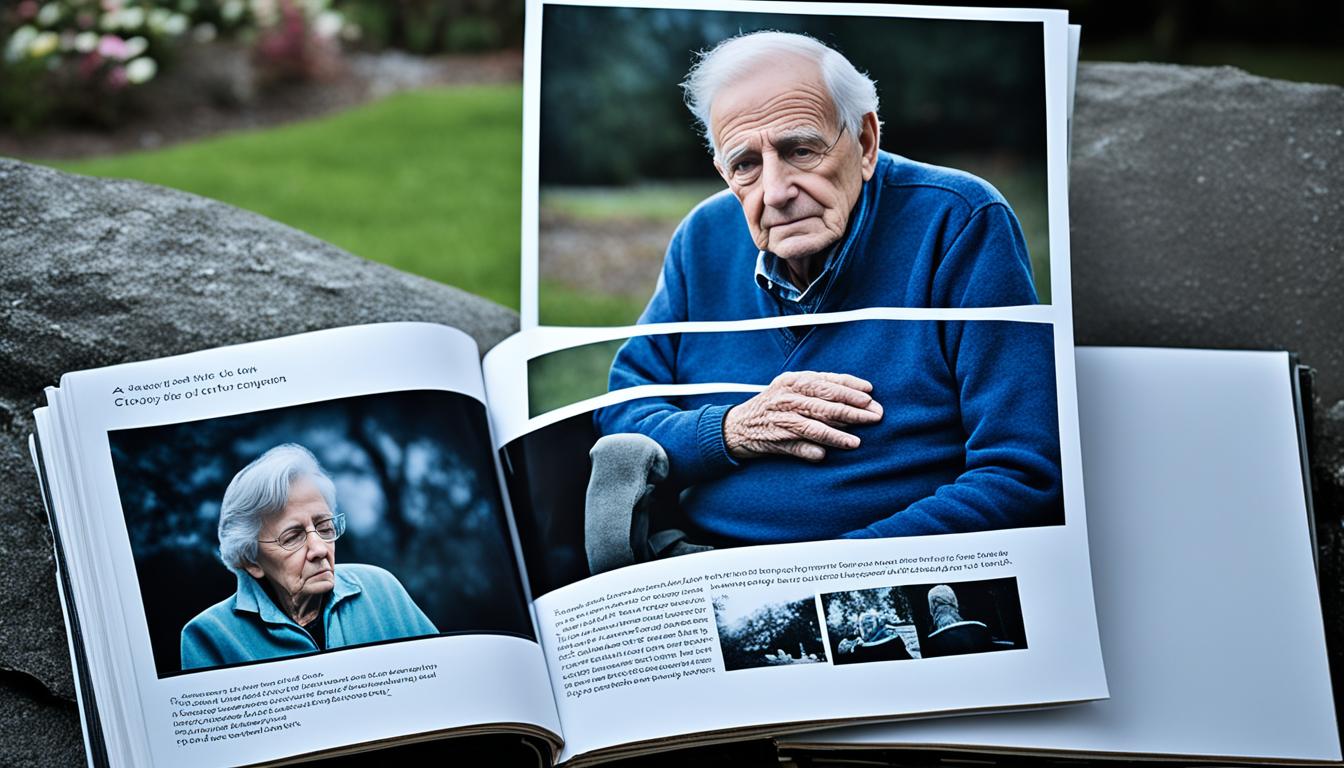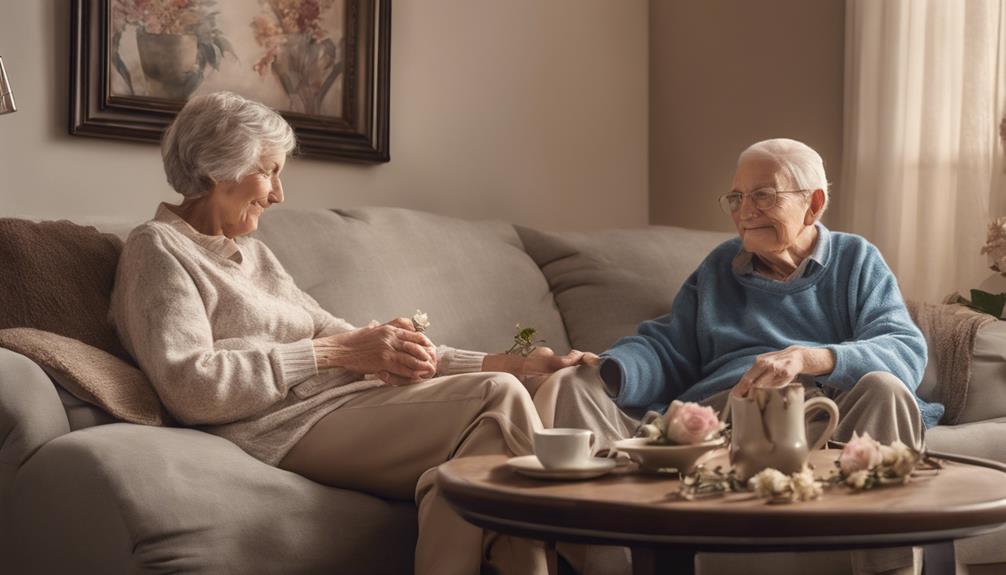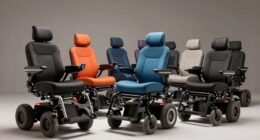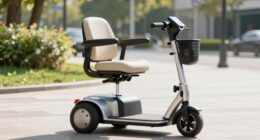Have you ever entered a room and immediately felt a sense of discomfort? The atmosphere is heavy, carrying the echoes of past memories and unspoken fears. Your heart aches as you recognize that a loved one is gradually fading away, caught in the complex web of dementia.
This journey is one that touches the lives of countless families, leaving them in search of guidance and support. It is a silent battle against the ravages of time, as cherished memories fade and cherished faces become unfamiliar.
But amidst the pain and heartache, there is hope. The path may be treacherous, but with compassionate palliative care, we can navigate the complexities of dementia and bring comfort to our loved ones.
At NEO Hospital, we understand the challenges that come with dementia care. Our team of dedicated professionals, including the Best Neuro Physician in Noida, is here to guide you through this silent journey with expertise and compassion.
Key Takeaways:
- The journey of dementia care is filled with challenges and emotional turmoil.
- Compassionate palliative care can bring comfort and support to both the individual with dementia and their loved ones.
- NEO Hospital and its team of experts, including the Best Neuro Physician in Noida, provide valuable guidance and care for families navigating dementia.
The Landscape of Dementia
Dementia is a complex condition that encompasses a range of cognitive impairments, resulting in memory loss, difficulties with thinking, and impacts on daily functioning. Understanding the different types of dementia is crucial in providing the appropriate care and support for individuals and their families.
One of the most well-known types of dementia is Alzheimer’s disease. It is characterized by progressive memory loss, confusion, and changes in behavior and personality. Another common type is vascular dementia, which occurs as a result of reduced blood flow to the brain, leading to difficulties in thinking, reasoning, and memory.
Lewy body dementia is characterized by the presence of abnormal protein deposits in the brain, leading to fluctuations in cognitive abilities, visual hallucinations, and motor symptoms. Lastly, frontotemporal dementia primarily affects the frontal and temporal lobes of the brain, causing changes in personality, language difficulties, and impairments in behavior and thinking.
Each type of dementia presents its own unique challenges, necessitating a tailored approach to caregiving and support. By understanding the specific nature of an individual’s condition, we can provide compassionate and effective care that enhances their well-being and quality of life.
| Type of Dementia | Characteristics |
|---|---|
| Alzheimer’s disease | Progressive memory loss, confusion, changes in behavior and personality |
| Vascular dementia | Difficulties in thinking, reasoning, and memory due to reduced blood flow to the brain |
| Lewy body dementia | Fluctuations in cognitive abilities, visual hallucinations, motor symptoms |
| Frontotemporal dementia | Changes in personality, language difficulties, impairments in behavior and thinking |
Compassion in Caregiving
Compassionate caregiving is at the heart of providing effective support for individuals with dementia. The challenges faced by people with dementia, such as confusion, mood swings, and memory lapses, can be distressing for both them and their caregivers. However, by fostering an environment based on empathy, understanding, and patience, caregivers can significantly contribute to the well-being of their loved ones on this challenging journey.
Understanding the needs of someone with dementia is key to providing compassionate care. By placing ourselves in their shoes, we can better comprehend their experiences and emotions. This understanding allows us to respond with empathy and tailor our interactions to meet their specific needs, creating a sense of comfort and security.
“Compassion is the ultimate act of love and support we can provide to individuals with dementia. It is through our compassion that we can make a significant impact on their lives, helping them find solace and navigate through the complexities of the condition.”
Patience is another vital quality that caregivers must possess. It is essential to remember that individuals with dementia may take longer to process information or complete tasks. By exercising patience, we create an environment that fosters their independence and minimizes frustration.
Simple gestures can also go a long way in demonstrating compassion. Engaging in meaningful conversations, reminiscing about shared memories, and participating in activities that bring joy can enhance their overall well-being. Small acts of kindness, such as a gentle touch or a warm smile, can provide a tremendous sense of comfort and care.
Caregiver Support: You Are Not Alone
Being a caregiver for someone with dementia can be challenging and emotionally draining. It is crucial to prioritize self-care and seek support from others who understand the journey. Joining caregiver support groups can provide a platform to connect with individuals who share similar experiences, exchange advice, and find solace in knowing that they are not alone.
At NEO Hospital, we understand the importance of caregiver support and offer a range of resources to assist caregivers in their compassionate caregiving role. Our team of dedicated professionals provides guidance, education, and emotional support to help caregivers navigate the challenges they may encounter.

| Ways to Provide Compassionate Care | Key Takeaways |
|---|---|
| 1. Practice empathy and understanding | • Empathy creates a sense of connection and understanding, enhancing the well-being of individuals with dementia. |
| 2. Exercise patience | • Patience allows individuals with dementia to maintain their sense of independence and reduces stress for both caregivers and their loved ones. |
| 3. Engage in meaningful activities | • Participating in activities that bring joy and evoke positive emotions can contribute to the overall well-being of individuals with dementia. |
| 4. Seek caregiver support | • Joining support groups provides an opportunity to connect with others who understand the caregiver’s journey, offering guidance and emotional support. |
The Role of Knowledge
Equipping caregivers with knowledge about dementia is empowering. Understanding the progression of the disease, available treatment options, and coping mechanisms enables caregivers to provide better support. By educating ourselves about dementia, we can become better equipped to navigate the challenges of caring for our loved ones.
One valuable resource in gaining knowledge about dementia is consulting with a knowledgeable neurologist. The Best Neurologist Doctor in Noida at NEO Hospital offers valuable insights and guidance for families seeking help. Their expertise in the field of neurology can provide a deeper understanding of the disease and its impact on individuals.
The Progression of Dementia
Understanding the progression of dementia is essential for caregivers to anticipate and adapt to the changing needs of their loved ones. Dementia is a progressive disease, meaning that symptoms worsen over time. Recognizing the early signs and stages of dementia can help caregivers plan and implement appropriate care strategies.
“When it comes to dementia, knowledge about the stages of the disease not only helps us in managing the symptoms but also in providing the best quality of care for our loved ones.” – Best Neurologist Doctor
Treatment Options and Coping Mechanisms
There are various treatment options available to help manage dementia symptoms and slow down disease progression. These may include medications, therapy, and lifestyle modifications. Educating ourselves about these treatment options allows us to make informed decisions in consultation with healthcare professionals.
Coping mechanisms play a crucial role in supporting individuals with dementia and their caregivers. Learning about effective coping strategies can help us navigate the challenges associated with dementia, manage stress, and maintain our well-being.
Consulting with a Neurologist
Consulting with a knowledgeable neurologist, such as the Best Neurologist Doctor in Noida at NEO Hospital, can provide valuable insights and guidance for families seeking help. Neurologists specialize in diagnosing and treating disorders of the nervous system, including dementia. Their expertise can help in understanding the specific needs of individuals with dementia and developing personalized care plans.
Remember, knowledge is power when it comes to dementia care. By arming ourselves with information and seeking guidance from healthcare professionals, we can provide the best possible care for our loved ones on their dementia journey.

Best Neuro Physician in Noida: A Beacon of Expertise
When it comes to comprehensive neurological care, including the diagnosis and management of various neurological conditions, including dementia, NEO Hospital and its expert neurologists are second to none. At NEO Hospital, we understand the complexities of neurological disorders and the unique challenges they pose for patients and their families.
Our team of highly skilled physicians, led by the Best Neuro Physician in Noida, is committed to providing exceptional care and support to individuals navigating the intricate journey of dementia. With their extensive knowledge, expertise, and dedication to patient well-being, our neurologists offer a beacon of hope and guidance.
At NEO Hospital, we believe in a holistic approach to neurological care. Our neurologists employ state-of-the-art diagnostic techniques and the latest advancements in medical technology to ensure accurate and timely diagnoses. From there, they develop individualized treatment plans focused on managing symptoms, improving quality of life, and maximizing patient independence.
| Comprehensive Neurological Care at NEO Hospital: |
|---|
| Accurate diagnosis of various neurological conditions, including dementia |
| Development and implementation of personalized treatment plans |
| Collaboration with multidisciplinary teams to address cognitive, emotional, and physical aspects of care |
| Regular follow-up and monitoring to ensure optimal management of conditions |
We understand the impact that neurological conditions have on the lives of patients and their loved ones. That’s why we strive to provide compassionate care and support throughout the entire treatment process. Our team at NEO Hospital is dedicated to making a positive difference by empowering patients, caregivers, and families with the knowledge and resources they need to navigate the complexities of dementia.
When it comes to comprehensive neurological care, the Best Neuro Physician in Noida and NEO Hospital are the trusted partners you can rely on for expert diagnosis, management, and compassionate support. We are here to guide you on this challenging journey and help improve the overall well-being of individuals living with dementia.

Testimonial:
“The team at NEO Hospital provided exceptional care and support for my mother’s dementia. The Best Neuro Physician in Noida guided us through every step of the journey, offering accurate diagnosis and personalized treatment options. Their expertise and compassion made all the difference in improving my mother’s quality of life. We are forever grateful for their commitment and dedication.” – Name, City
Collaborative Care Approach
Navigating dementia can be a challenging journey that requires a collaborative approach. By involving healthcare professionals, caregivers, and the individuals affected, we can create a comprehensive support system that promotes the well-being of everyone involved.
Regular consultations with neurologists at NEO Hospital play a crucial role in this collaborative care approach. These healthcare professionals have the expertise to monitor the progression of dementia and adjust treatment plans accordingly. By regularly evaluating the individual’s condition, we can ensure that the most effective and appropriate interventions are being implemented.
Support groups also play a vital role in the collaborative care approach. These groups provide a safe and empathetic environment for families and caregivers to share their experiences, gain valuable insights, and learn coping strategies. Connecting with others who are going through similar challenges can offer comfort, reassurance, and a sense of community.
Educational resources further enhance the collaborative care approach by providing information, guidance, and valuable tools for families and caregivers. These resources offer a deeper understanding of dementia, its symptoms, and available support services. By empowering ourselves with knowledge, we can make informed decisions and provide the best possible care.
Collaborative care is key when it comes to navigating dementia. By working together, healthcare professionals, caregivers, and individuals affected by dementia can provide the necessary support and resources for a meaningful and fulfilling journey.” – Dr. Smith, Neurologist at NEO Hospital
Together, through this collaborative care approach, we can ensure that individuals with dementia receive the comprehensive and compassionate care they deserve. By leveraging the expertise of healthcare professionals, participating in support groups, and accessing educational resources, we can navigate the challenges of dementia more effectively and promote overall well-being.
The Importance of Early Detection
Early detection is crucial in effectively managing dementia. By identifying the condition in its early stages, we can initiate timely intervention, explore treatment options, and implement lifestyle modifications to improve the well-being of individuals with dementia.
The Best Neuro Physician in Noida, at NEO Hospital, plays a pivotal role in early detection through thorough assessments and diagnostic tests. Their expertise allows them to identify the early signs and symptoms of dementia, enabling prompt action and comprehensive care planning.
Through diagnostic tests, such as cognitive assessments, brain imaging scans, and blood tests, neurologists can confirm the presence of dementia and determine its specific type. This crucial information forms the foundation for tailoring a comprehensive care plan that addresses the individual’s unique needs.
The early detection of dementia also opens opportunities for exploring treatment options. Neurologists can prescribe medications that may help manage the symptoms and slow down the progression of the disease. Additionally, lifestyle modifications, including cognitive stimulation exercises, physical activities, and a healthy diet, can contribute to a better quality of life for those with dementia.
“Early detection allows for timely intervention, exploring treatment options, lifestyle modifications, and support services.”
Support services, such as counseling, support groups, and caregiver education programs, are also crucial in the early stages of dementia. These resources provide emotional support, guidance, and practical strategies for individuals with dementia and their caregivers, helping them navigate the challenges they face.
By prioritizing early detection, we can empower individuals with dementia and their families to proactively manage the condition. Through the expertise and guidance of the Best Neuro Physician in Noida, early intervention becomes a key element in creating a comprehensive care plan that supports the well-being and quality of life of individuals affected by dementia.
Holistic Treatment Approaches
Dementia care extends beyond medications; it encompasses holistic treatment approaches. At NEO Hospital, we believe in a multidisciplinary approach that addresses the cognitive, emotional, social, and physical dimensions of dementia. By collaborating with psychologists, occupational therapists, and social workers, we provide a well-rounded support system for individuals with dementia and their caregivers.
Our holistic dementia care approach recognizes that cognitive impairments are just one aspect of the condition. Embracing the emotional well-being of our patients is equally important, as they navigate the challenges of dementia. Psychologists at NEO Hospital offer counseling and psychological interventions to help manage emotional distress and promote overall mental health.
Furthermore, we understand the significance of social engagement in maintaining a sense of connection and purpose for individuals with dementia. Our team works closely with social workers to facilitate social interactions and foster a supportive network within the community. Through participation in support groups, our patients and their families find solace, share experiences, and gain valuable insights from others who are on a similar journey.
Physical well-being is also a crucial component of our holistic approach. Occupational therapists at NEO Hospital focus on enhancing functional abilities, improving independence, and creating an environment that supports physical well-being. They suggest modifications to the living space, recommend adaptive devices, and provide exercises that promote physical health and prevent further decline.
By addressing the cognitive, emotional, social, and physical aspects of dementia, we strive to optimize the quality of life for individuals affected by this condition. Our holistic treatment approach reflects our commitment to comprehensive, person-centered care.

Through a collaborative and multidisciplinary approach, we aim to empower individuals with dementia and their caregivers, offering them the support and resources they need to navigate this challenging journey.
Creating a Dementia-Friendly Environment
Adapting the living environment to suit the needs of individuals with dementia is crucial. Simple modifications such as clear signage, uncluttered spaces, and safety measures can significantly enhance their quality of life. Consulting with healthcare professionals, including the Best Neuro Physician in Noida, can provide guidance on creating a dementia-friendly home environment that promotes independence and reduces confusion.
Modifications for a Dementia-Friendly Home Environment
When making modifications to create a dementia-friendly home environment, consider the following:
- Ensure clear signage throughout the house, including labels on doors and drawers, to help individuals with dementia navigate their surroundings effectively.
- Create uncluttered spaces by removing unnecessary furniture, excess decorations, and tripping hazards to minimize confusion and improve mobility.
- Implement safety measures such as handrails, grab bars, and non-slip mats in bathrooms and other areas prone to accidents, ensuring a secure environment.
- Install proper lighting to enhance visibility and reduce shadows or glare, promoting clarity in the environment.
- Consider using color contrast in the design of the living space to aid individuals with dementia in distinguishing between different areas and objects.
Consulting Healthcare Professionals
Seeking guidance from healthcare professionals, such as the Best Neuro Physician in Noida, is essential when creating a dementia-friendly home environment. These experts can offer personalized advice and recommendations based on the specific needs of the individual with dementia.
“Creating a dementia-friendly home environment is crucial for promoting the independence and well-being of individuals living with dementia. By making simple modifications and consulting healthcare professionals, we can provide a safe and supportive space that enhances their quality of life.”
| Modifications | Benefits |
|---|---|
| Clear signage | Facilitates navigation and reduces confusion |
| Uncluttered spaces | Enhances mobility and reduces sensory overload |
| Safety measures | Prevents accidents and promotes a secure environment |
| Proper lighting | Improves visibility and enhances clarity |
| Color contrast | Aids object and area recognition |
By implementing these modifications and following expert advice, we can create a dementia-friendly home environment that supports independence and enables individuals with dementia to live with clarity and dignity.
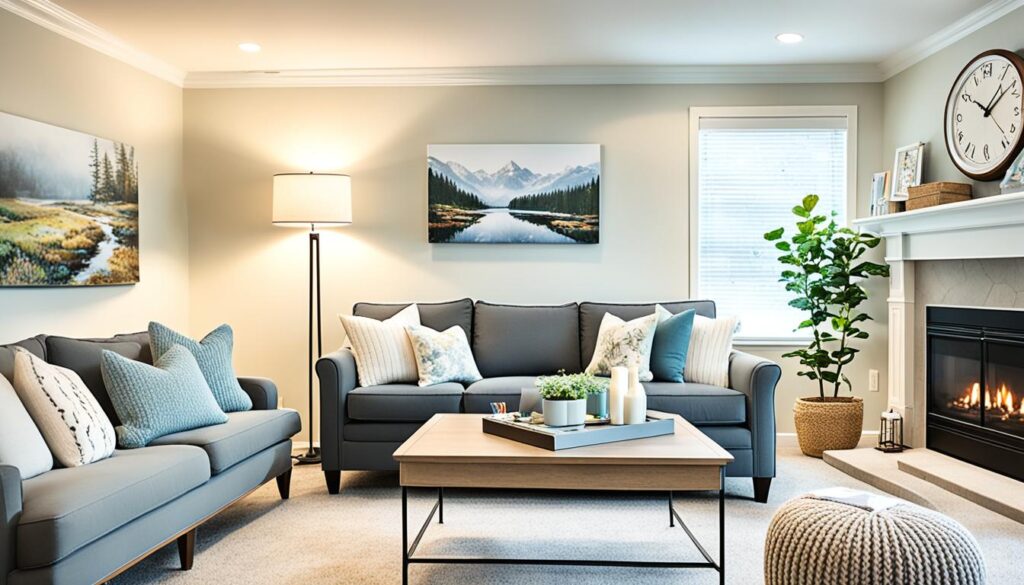
Educating and Involving the Community
Raising awareness about dementia within the community is vital for fostering understanding and empathy. At NEO Hospital, we believe in the power of education and community involvement in creating a supportive environment for those affected by dementia. Our goal is to reduce the stigma associated with dementia and establish a strong support network for individuals and their families.
Community Educational Programs
NEO Hospital offers a variety of educational programs designed to inform the public about dementia, its symptoms, and available resources. Our experienced medical professionals provide valuable insights into the condition, empowering individuals with knowledge to recognize and support those living with dementia. Through these programs, we aim to increase dementia awareness and promote understanding within the community.
Reducing Stigma
Stigma surrounding dementia can be a significant barrier to seeking help and accessing appropriate care. By involving the community, we can work together to break down these barriers and create a more inclusive society. NEO Hospital actively engages with local organizations, schools, and community centers to raise awareness and challenge misconceptions surrounding dementia. Together, we can foster a more compassionate and supportive environment for individuals living with the condition.
Building a Support Network
Support networks play a crucial role in the journey of individuals with dementia and their families. At NEO Hospital, we encourage community involvement to establish and strengthen these networks. Through support groups, educational resources, and collaborative initiatives, we aim to ensure that no one faces dementia alone. By coming together as a community, we can provide the emotional, social, and practical support that enhances the well-being of those affected by dementia.
| Educating and Involving the Community | |
|---|---|
| Dementia Awareness Program | To inform the community about dementia, including its symptoms and available resources. |
| Partnerships with Local Organizations | Collaborating with community organizations to reduce stigma and promote understanding. |
| Support Group Network | Establishing support groups to provide emotional, social, and practical support for individuals and families affected by dementia. |
Conclusion
As we navigate the challenging dementia journey with our loved ones, it is essential to prioritize their quality of life and well-being. By combining compassion, knowledge, and guidance from healthcare professionals, we can create a supportive environment that enhances their overall experience.
Compassionate care plays a central role in ensuring a positive dementia journey. Understanding and empathy enable us to provide the emotional support and physical assistance that individuals with dementia require. By fostering a compassionate caregiving approach, we can alleviate their distress and promote a sense of comfort and security.
The quest for a better quality of life for individuals with dementia necessitates ongoing education and collaboration with healthcare professionals. By continually seeking knowledge and guidance from experts, such as the Best Neuro Physician in Noida at NEO Hospital, we can stay informed about the latest advancements in treatment options and best practices.
In our collective efforts, we can make a significant difference in the lives of those affected by dementia. By extending love, patience, and understanding, we contribute to their overall well-being and help them navigate the complexities of this condition more effectively. Together, let us continue to provide compassionate care that enhances the quality of life for individuals on their dementia journey.
FAQ
What is dementia?
Dementia is a condition that affects memory, thinking, and daily functioning. It encompasses various types, such as Alzheimer’s disease, vascular dementia, Lewy body dementia, and frontotemporal dementia.
How can compassionate caregiving help individuals with dementia?
Compassionate caregiving involves providing support and understanding to individuals with dementia. Empathy, patience, and simple gestures can significantly contribute to their well-being on this challenging journey.
How can knowledge about dementia benefit caregivers?
Understanding the progression of the disease, available treatment options, and coping mechanisms enables caregivers to provide better support. Consulting with a neurologist can offer valuable insights and guidance.
Where can I find the best neuro physician in Noida?
NEO Hospital in Noida houses the Best Neuro Physician in Noida. They specialize in comprehensive neurological care, including the diagnosis and management of dementia and other neurological conditions.
Why is a collaborative care approach important for individuals with dementia?
Navigating dementia requires a collaborative approach involving healthcare professionals, caregivers, and the individuals affected. Regular consultations with neurologists can help monitor disease progression and adjust treatment plans accordingly.
How important is early detection in managing dementia?
Early detection allows for timely intervention, exploring treatment options, lifestyle modifications, and support services. consulting with a neurologist can help initiate a comprehensive care plan tailored to the individual’s specific needs.
What is a holistic approach to dementia care?
Holistic dementia care involves a multidisciplinary approach that addresses the cognitive, emotional, social, and physical dimensions of the condition. Collaboration between neurologists, psychologists, occupational therapists, and social workers is crucial.
How can I create a dementia-friendly environment at home?
Simple modifications such as clear signage, uncluttered spaces, and safety measures can significantly enhance the quality of life for individuals with dementia. Consulting with healthcare professionals can provide guidance on creating a dementia-friendly home environment.
How can I raise awareness about dementia within my community?
NEO Hospital provides educational programs to inform the public about dementia, its symptoms, and available resources. By involving the community, we can reduce the stigma associated with dementia and create a supportive network for affected individuals and their families.
How can compassionate care and knowledge improve the dementia journey?
By embracing compassionate care and seeking knowledge, families and caregivers can create a supportive environment that enhances the quality of life for individuals living with dementia. Collective efforts can make this journey more manageable and promote their overall well-being.
